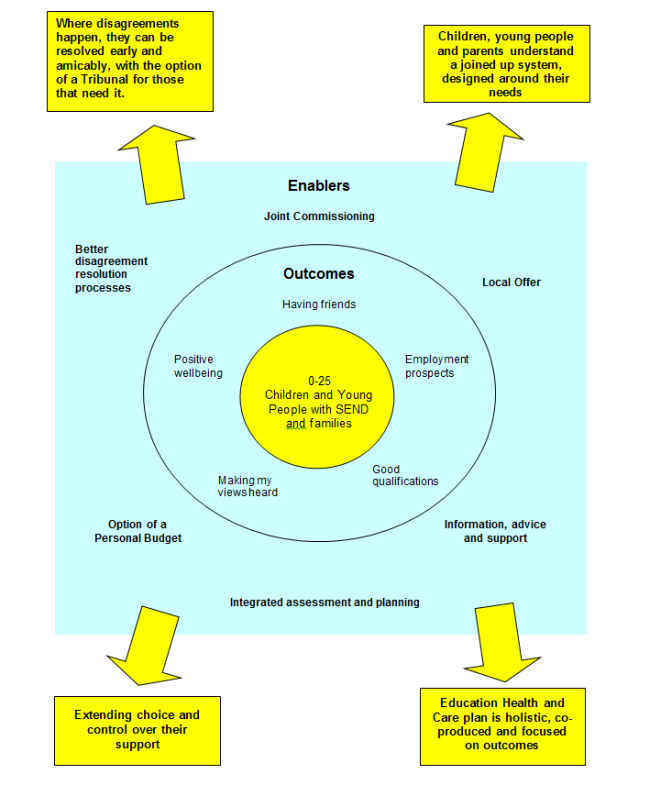1.1 The special educational needs and disability code of practice: 0 to 25 years (2014)
The SEND Code of Practice (external link) reflects the content and ambition of the Children and Families Act (2014). The key points are:
- It covers the 0-25 age range and includes guidance relating to disabled children and young people as well as those with SEN
- Children, young people and parents are much more involved in decision-making at individual and strategic levels
- High aspirations and improving outcomes for children and young people are paramount
- Joint planning and commissioning of services to ensure close co-operation between education, health and social care is at the heart of the reforms
- A Local Offer of support for children and young people with SEN or disabilities will be published by Local Authorities
- A graduated approach to identifying and supporting pupils and students with SEN is emphasised with a category of “SEN Support” replacing School Action and School Action Plus
- For children and young people with more complex needs a co-ordinated assessment process and the new 0-25 Education, Health and Care plan (EHC Plan) replaces Statements of SEN and Learning Difficulty Assessments (LDAs)
- There is a greater focus on support that enables those with SEN to succeed in their education and make a successful transition to adulthood
- Information is provided on relevant duties under the Equality Act 2010 and the Mental Capacity Act 2005.
1.2 What does this mean for Wigan?
Although there are changes to the systems for delivering support through EHC Plans, the key feature of the reforms will be how families, children and young people are involved in the whole process.
This means:
- Putting the family at the centre
- Doing things with the family, not to the family
- Asking what we can do, not doing what we always do
- Listening and understanding.
The diagram below shows that by putting children and young people at the centre of the process, identifying the outcomes that are important to them and using the principles of the new legislation results in an assessment and planning process that delivers better results for families.

Adapted from “A DfE presentation pack for school leaders: The 0-25 Special Educational Needs and Disability Reforms” (July 2014)
The reforms aim to join up help across education, health and care, from birth to 25. Help will be offered at the earliest possible point, with children and young people with SEND and their parents fully involved in decisions about their support and what they want to achieve. This will help lead to better outcomes and more efficient ways of working.
The process of engaging parents at every level - from strategic service commissioning through to individual plans is vital. Good engagement is essential to manage expectations in what are tricky decisions. Parents need to know they’ve been listened to, understand the rationale behind decisions and what is intended to be achieved. It is equally essential that children and young people are fully involved in the process.
The United Nations Convention on the Rights of the Child (1989) changed the way that children are viewed and treated, that is as human beings with a distinct set of rights. Article 12 of the Convention states that when adults are making decisions that affect children, children have the right to say what they think should happen and have their opinions taken into account.
On the 25th Anniversary year of the UNCRC, The Special Educational Needs and Disability Code of Practice: 0-25 years, was published. This document places an important emphasis upon involving children and young people in decision-making at individual and strategic levels.
“Local authorities must consult the child and the child’s parent or the young person throughout the process of assessment and production of an EHC plan. They should also involve the child as far as possible in this process. The needs of the individual child and young person should sit at the heart of the assessment and planning process. Planning should start with the individual and local authorities must have regard to the views, wishes and feelings of the child, child’s parent or young person, their aspirations, the outcomes they wish to seek and the support they need to achieve them.”
“Special Educational Needs and Disability Code of Practice: 0 to 25 Years” (2014), para 9.21